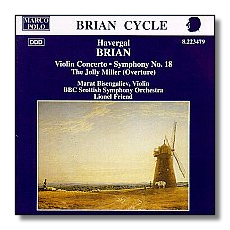
The Internet's Premier Classical Music Source
Related Links
- Brian Reviews
- Latest Reviews
- More Reviews
-
By Composer
-
Collections
DVD & Blu-ray
Books
Concert Reviews
Articles/Interviews
Software
Audio
Search Amazon
Recommended Links
Site News
 CD Review
CD Review
Havergal Brian

- Overture "The Jolly Miller"
- Violin Concerto
- Symphony #18
Marat BISengaliev, violin
BBC Scottish Symphony Orchestra/Lionel Friend
Marco Polo 8.223479 DDD 54:39
Sales of the heaven-storming Gothic (8.223280-281) have been good enough (an astonishing five figures, apparently) to encourage Marco Polo – with a not a little help from the Havergal Brian Society and the Rex Foundation – to pursue an entire cycle of the Havergal Brian Symphonies, something that would have seemed beyond the wildest dreams of the growing band of Brianites only a few years ago. This is now the third instalment after The Gothic, following the violent enthusiasms of Symphony #4, Das Siegeslied, a blood-curdling outpouring of orchestral and choral violence (coupled with the elliptical #12 on 8.223447) and the Elgarian dignity of the tone-poem In Memoriam (with the Festal Dance and #17 and 32 on 8.223481). Leaving the altogether exceptional Gothic aside, this newest disc is the most successful yet, and will do much to win new converts to the Brian cause.
The disc adopts the typical concert-hall format of overture, concerto and symphony, beginning with The Jolly Miller, Brian's third 'comedy overture', written in 1962, when he was 86. It takes the form of introduction, theme and variations, is full of sly, bright wit, buoyant rhythms and brash energy and makes an ideal starting-point for the newcomer to Brian's late style and his highly individual approach to the orchestra.
Of these three works the one that will do most to drum up those new recruits is the Violin Concerto. To my mind it's one of the greatest British violin concertos, fully on a par with the Elgar (and the Bernard Stevens, barely known but a fine work nonetheless), better by far than the Walton and the Britten. It has a solid strength which is very different from the burnished beauty of the Elgar, but like that work it is shot through with wonderfully memorable tunes – not a characteristic commonly associated with Brian.
It has an unusual history. On 7 June 1934 Brian finished the short score of a violin concerto and took it in to work at Musical Opinion the next day. But before his train reached Victoria Station, his bag, and the score with it, had vanished. Immediately afterwards Brian set to work to compose another concerto (one of only two he would complete), using what material he could remember from the sketch of the first. The new concerto lay unperformed until Ralph Holmes took it up in 1969; my first acquaintance with it in the flesh came ten years later when Holmes performed it in St. John's, Smith Square, ten years later. Since then I have had no doubts as to the work's stature, and I am delighted that this new performance is every bit as good as Holmes' was.
Brian initially called the concerto The Heroic (he later removed the name) and it swiftly becomes obvious why. The solo part does indeed require some heroic playing. The violin writing is ferociously difficult, with the orchestral textures often giving little quarter – and the orchestra itself is large: triple woodwind, full brass, harp, strings and percussion. The core of the work is its central passacaglia, a deeply moving demonstration of the depths of Brian's musical imagination – though there is also some extremely noble music in the movements either side of it. What makes the concerto so easily approached is the Englishness of its principal themes: there is nothing else in his oeuvre quite so unashamedly reminiscent of folksong (The Jolly Miller is his only use of genuine folk material). I can virtually guarantee that you'll come away from your first hearing whistling its tunes. But you'll also be deeply impressed.
The Eighteenth Symphony, written in 1961, is again Brian at his most approachable. It's in three movements, all in march form. The first is tight, bright and optimistic, often reminiscent of Busoni, directly so in the flute writing, and here and there I caught suggestions that Brian was acquainted with the music of Robert Simpson, the man responsible more than any other for the fact that his own music was by now getting a hearing. The march that emerges from the diaphonous orchestral lines that begin the slow movement builds up to a powerful climax, after which the perky final movement jerks the listener back into a quick trot, though crossing some darker moments on the way.
The ever-reliable Lionel Friend obtains excellent results from the BBC Scottish Symphony Orchestra – he is a conductor fully attuned to the Brian idiom, which has flummoxed several of his colleagues in the past; and Marat BISengaliev, the 32-year-old Kazakh soloist in the Concerto, plays breathtakingly well in a part that might scare off many better-known names. But this name will itself be well enough known before too long.The notes, by Malcolm MacDonald, are a model of informative clarity. For anyone interested in British music of this century this disc is a mandatory purpose. Everybody else will enjoy it as well. Fervently recommended.
Copyright © 1994 & 1998, Martin Anderson.
This review originally appeared in CD Review


















